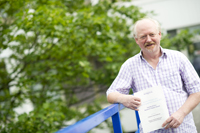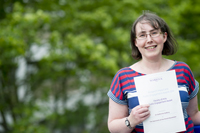Arts Impact Awards 2014
Congratulations to David Anderson, History, winner of the 2014 Arts Impact Award and to Kate Astbury, French, winner of the 2014 Arts Public Engagement Award.
The Arts Impact Awards have been distributed since 2011. The 2014 Arts Impact Award was awarded as part of the University's new Public Engagement and Impact Awards to be distributed across all faculties. New for 2014 was the Arts Public Engagement Award.
 David Anderson, History, Professor of African History, Arts Impact Award Winner 2014
David Anderson, History, Professor of African History, Arts Impact Award Winner 2014
Professor Anderson led a public campaign for the release of secret documents hidden by the Foreign and Commonwealth Office, the Cabinet Office and other public bodies about British de-colonisation in Africa.
As a result of his expertise in this area, David was invited to give a statement at the High Court case brought by Kenyan survivors of the Mau Mau emergency in 1950s Kenya against the British government for torture and human rights abuses. David's statement revealed that there was a secret cache of documents held by the FCO. These documents, ordered by the court to be released, proved the claims made by the Kenyan claimants resulting in an out of court settlement by the government in May 2013.
David's ongoing research and his public campaign has forced the FCO to admit to another secret archive of nearly 1 million documents. David has spoken widely in public about the government's secret archives including more than 60 international media appearances and more than 40 print media features since 2011.
 Kate Astbury, French Studies, Associate Professor, Arts Public Engagement Award Winner 2014
Kate Astbury, French Studies, Associate Professor, Arts Public Engagement Award Winner 2014
As a specialist in print and visual culture during the French Revolution, Kate led a project with the National Trust property Waddesdon Manor to uncover and explore some of their valuable prints dating from the French Revolution.
These prints were digitised and made publicly available on the Waddesdon Manor website along with detailed information about the prints and their context. By digitising the prints, Kate has been able to re-use them in other contexts. In particular, they have been used to support school workshops and create resources for students learning about the French Revolution and its themes such as justice and human rights.
The prints have been used to enhance teaching of the French Revolution for all ages - from primary to college. Kate's latest initiative is to run a stop animation competition for primary school students in Coventry to commemorate the 225th anniversary of the fall of the Bastille.
Impact and Public Engagement Awards: Background and Rationale
University research in the arts and humanities makes important societal contributions – from broadening knowledge about diverse cultures to re-evaluating government policies – many of which are under-appreciated. Further, many arts and humanities academics take steps to share their research, both the process and the outcomes, with members of the public regardless of the agenda proposed by the UK government and its research councils.
The rationale underpinning the Arts Impact Award is to recognise arts researchers for the time, hard work and consideration they put into engaging the public with the benefits of their research, and which is not otherwise rewarded within the university.
By acknowledging this important aspect of the researcher's work, it will help strengthen research-related impact as a core component of the university's research plans and place it at the heart of all research projects. It will encourage academics to reassess the ways in which research projects are created, carried out and disseminated so that they are conducted in such a way as to bring the greatest amount of benefits to the greatest number of people.
Criteria for Award Winners
Due to the time lag and typical long-term nature of research-related impact, this award seeks to recognise those individuals who have undertaken public engagement with the intention of achieving the greatest possible impact in innovative or interesting ways, rather than recognising the achievement of impact itself.
For the 2014 awards, researchers were nominated based on the criteria below:
- The researcher involved the public in any aspect of their research
- Made efforts to communicate their research findings to non-academic audiences
- Engaged with the public through knowledge sharing activities related to the researcher’s general research area
- May have been related to a specific or funded research project but not necessarily
| Name | Description |
|---|---|
| 2013 | 3rd Annual Impact Awards 2013. Winner: Dr Sarah Richardson, Associate Professor, History |
| 2012 | 2nd Annual Impact Awards 2012. Winners: Dr Rachel Moseley and Dr Helen Wheatley, Film & TV |
| 2011 | Inaugural Arts Faculty Impact Award. Winner: Dr Milija Gluhovic, School of Theatre and Performance Studies, for Eurovision and the new Europe |
